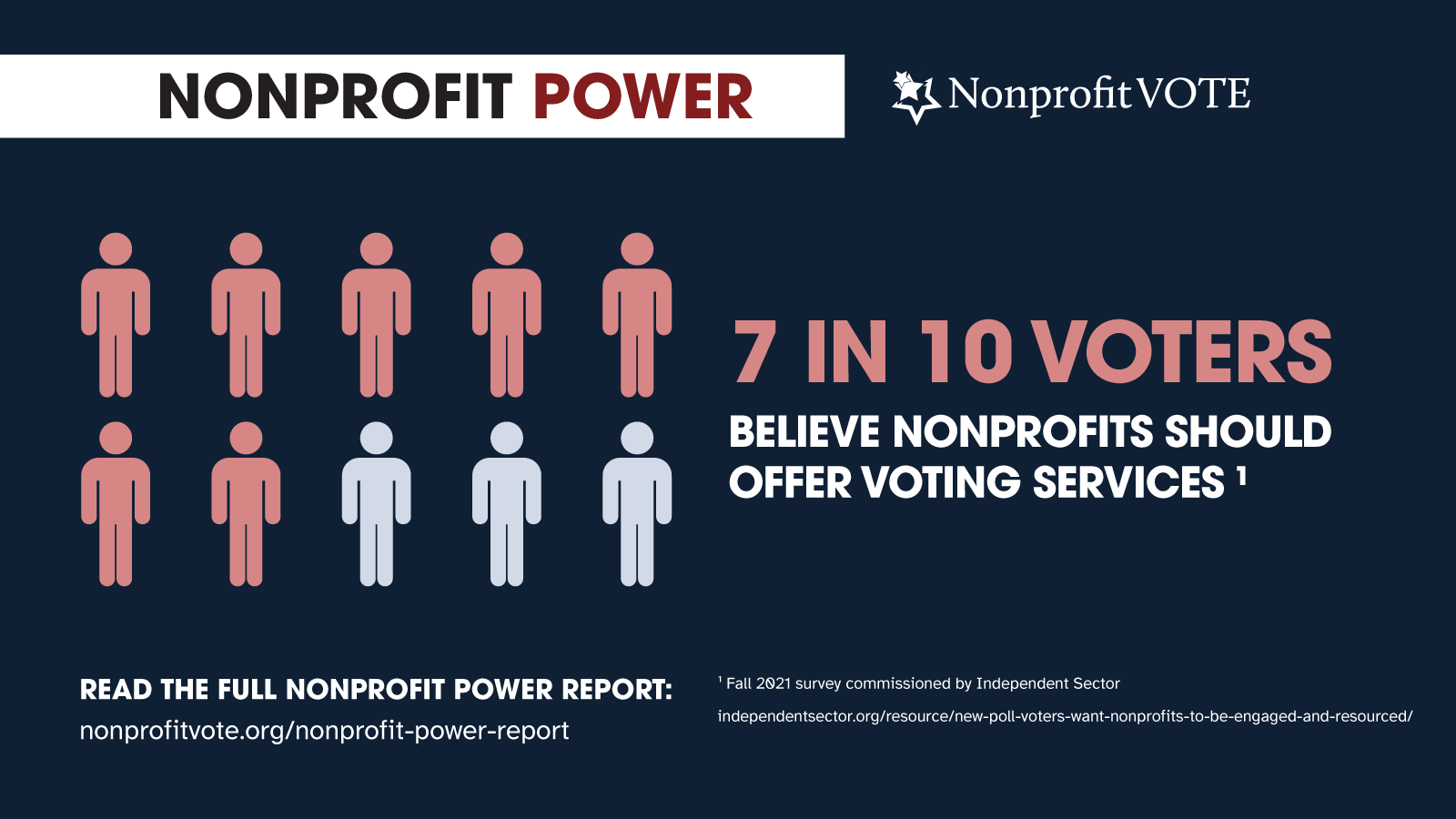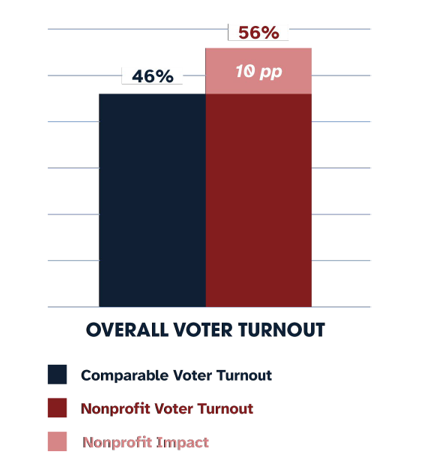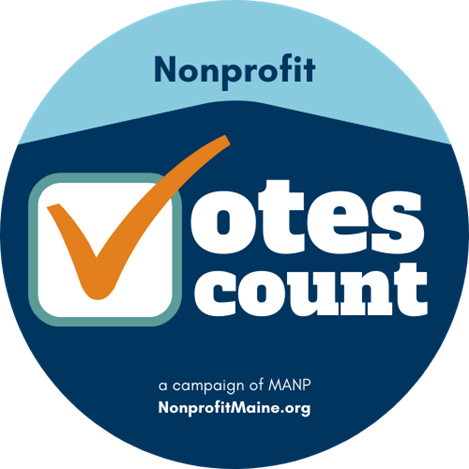Nonprofits + Elections
Nonpartisan does not mean nonparticipation!
 Many nonprofits mistakenly believe they can’t get involved in elections at all. 501(c)(3) nonprofits are banned from endorsing candidates, but there are numerous ways nonprofits can–and should–promote voter and civic engagement as part of their charitable and educational mission during the election season.
Many nonprofits mistakenly believe they can’t get involved in elections at all. 501(c)(3) nonprofits are banned from endorsing candidates, but there are numerous ways nonprofits can–and should–promote voter and civic engagement as part of their charitable and educational mission during the election season.
We have compiled checklists and resources to help 501(c)(3) nonprofits ensure their election year advocacy and get out the vote efforts remain nonpartisan.
Why Get Involved? Key Dates 3 Easy Actions Election Law Basics
Voter Engagement Candidate Engagement Additional Resources
Why Get Involved?
Why should your organization talk about elections?
Nonprofits have the power to foster a more inclusive democracy. People engaged by nonprofits are much more likely to vote than comparable voters.1

In years like 2025, voter turnout is often lower because there are not any federal elections, and those elections often generate the most attention. But local and state elections can greatly impact the day-to-day lives of your community members, and lower voter turnout can mean very close races!
This year, there are two statewide ballot questions and there may be municipal (city council, school board, or other) elections in your town.
Remember, advocating for or against a ballot question is considered lobbying. Nonprofits can take a position on ballot questions, but you should learn the rules around lobbying and ballot question committees. If you take no position and simply educate about the existence of the ballot questions (like this blog post!), then it does not count as lobbying.
The two questions are:
QUESTION 1: Citizen Initiative
Do you want to change Maine election laws to eliminate two days of absentee voting, prohibit requests for absentee ballots by phone or family members, end ongoing absentee voter status for seniors and people with disabilities, ban prepaid postage on absentee ballot return envelopes, limit the number of drop boxes, require voters to show certain photo ID before voting, and make other changes to our elections?
QUESTION 2: Citizen Initiative
Do you want to allow courts to temporarily prohibit a person from having dangerous weapons if law enforcement, family, or household members show that the person poses a significant danger of causing physical injury to themselves or others?
Key Dates for the 2025 Election
- October 5 — October 30: In-person absentee voting for the general election. Location varies by town.
- October 14: Deadline to register to vote in the general election if registering by mail or online. If you miss this deadline, you can still register in person
- October 28: Deadline to complete voter registration through the Bureau of Motor Vehicles (in person).
- November 4: Election Day. In Maine, you can sign up to register and vote on the same day! There are two statewide ballot questions
https://www.usvotefoundation.org/maine-election-dates-and-deadlines
3 Easy, Legal Ways for Your Nonprofit to Engage in the Election
- Share information about voter registration. In Maine, registering to vote is easier than ever before because we now have online voter registration. You can include a link in your newsletter, on social media, or even on your website to make it even easier for your community to get registered! Don't forget to remind your staff and volunteers, too!
- Share information about Election Day. Remind people that Election Day is November 4th, and that people can find out where to vote using this tool.
- Give your employees time off to vote. See our blog post for template policies and tips on implementing this at your workplace.
Election Law Basics for Nonprofits
- Important to remember: stay nonpartisan! Nonprofits must maintain nonpartisanship, and cannot indicate support or opposition to candidates or political parties.
- Free Webinar Recording from Nonprofit Vote: Staying Nonpartisan for 501(c)(3) organizations
- 501(c)(3) nonprofits can use this sample to develop an election year memo or employee handbook policy to remind their staff and volunteers that certain election activities on behalf of the organization, or using the resources of the 501(c)(3), are prohibited.
- 501(c)(4) organizations can participate in political (or campaign intervention) activities under federal tax law. Find election year guidance for 501(c)4 organizations here.
- More questions? Bolder Advocacy has answers to just about every nonprofit advocacy question you can think of!
Voter Engagement - Get Out the Vote (GOTV)
 Our democracy–and the nonprofit sector–depend on good government and fair and open elections. When candidates are elected by a minority of eligible voters, they may not represent or understand the issues nonprofits care about.
Our democracy–and the nonprofit sector–depend on good government and fair and open elections. When candidates are elected by a minority of eligible voters, they may not represent or understand the issues nonprofits care about.
Nonprofits are particularly well suited to encourage voter participation among their staff, volunteers and constituents. Not only do nonprofits reach populations that are less likely to vote, but they are effective in increasing turnout among these groups—reducing disparities in who votes based on age, income, and race/ethnicity.
MANP and Maine Philanthropy Center teamed up with NonprofitVote to create a NEW Nonprofit + Funder Voter Engagement Guide, and a free webinar with proven practices.
Nonprofits + Elections Presentation Slides
Candidate (and Media!) Engagement
Nonprofit businesses employ 1 in 6 Maine workers representing a workforce of over 100,000 and channel the energy of about 400,000 volunteers annually. This is a voting block that candidates will want to reach.
- Understand the rules of commenting on candidates and campaigns.
- Do a candidate questionnaire. (Check out MANP's candidate questionnaire for the state legislature.
- Use MANP's free Frames That Work toolkit to educate your audience about your impact.
- Members can watch a recording of our session “Share Your Story: Advocacy Through Earned Media” in our webinar library.
Maine Candidates on Nonprofits
Additional Resources
- Visit NonprofitVote.org and sign up for their newsletter for tons of resources and advice on encouraging voter participation.
- Maine Secretary of State's Elections & Voting web page
- Secretary of State's page on Ranked Choice Voting
- Vote411.org - a project of the League of Women Voters
- League of Women Voters of Maine Voter Toolkit
- Not sure about your district? Use this tool!
- Video Series: Framing Social Issues During Election Season (FrameWorks Institute)
MANP’s goal is to educate nonprofits and legal and effective advocacy and election season activity, to educate candidates about the impact and potential of the nonprofit sector, and to educate voters by soliciting information directly from candidates on how they would strengthen and partner with the sector if elected. MANP does not endorse candidates or promote or endorse any political party. All activities are designed to comply with the IRS guidelines for acceptable political activity of a 501(c)(3), nonprofit organization.
